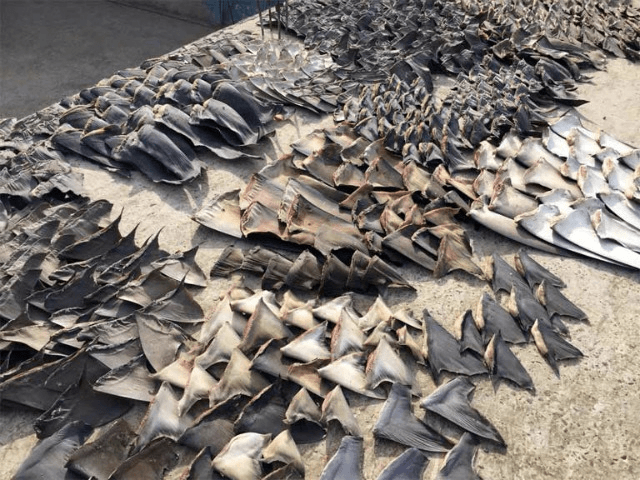The leftist government of Ecuador, a close ally of China, has lodged a stern protest against Beijing this week after seizing an illegal fishing vessel carrying thousands of endangered sharks. China’s presence in the waters of Latin America has grown as the lucrative illegal fish market has grown.
“Any ship or vessel that illegally fishes in our territorial seas will be immediately detained,” President Lenin Moreno said on Monday. “We are strengthening, in a decisive and urgent way, the operational capacity of our fleet so that we can combat these threats. We will not allow them to violate our maritime sovereignty!”
Ecuador also summoned the Chinese ambassador in Quito to lodge a formal protest against the presence of Chinese ships in Ecuadorian waters.
Moreno referred to the seizure of the Fu Yuan Yu Leng 999, a Chinese ship, last week, in the Galapagos archipelago, a UNESCO World Heritage Site where fishing is prohibited to conserve the uniquely vibrant ecosystem, home to the world’s largest concentration of sharks. The ship was carrying thousands of endangered shark species—300 tonnes of fish in total—butchered largely for their fins. Shark fin is extremely popular and selling it in Asia has grown into an extremely lucrative business.
“Not necessarily all of the catch came from the marine reserve, but the fact that it included young sharks, even baby sharks, indicates that they could have been caught inside the reserve,” Environmental Minister Tarsicio Granizo confirmed following the arrest of the fishermen. According to the BBC, 20 fishermen found on the ship are facing up to three years in prison for their actions.
While Ecuadorian authorities managed to stop this particular ship while it violated the maritime sovereignty of the nation, and Moreno responded with an aggressive reprimand of China, the logistical ability to prevent China’s significant Latin American presence from violating their sovereignty on a regular basis may simply not exist. Ecuador’s Chief of Naval Operations Carlos Zumárraga lamented last week, shortly after the detention of the Fu Yuan Yu Leng 999, that Ecuador does not have the resources necessary to fully protect the Galapagos reserve. Ecuador’s Marine Guard suggested there were 300 Chinese vessels in the area, 197 visible from the nation’s Exclusive Economic Zone (EEZ), all monitored by one helicopter, one coast guard ship, and a hunting plane.
Ecuador is a recent signatory to the UN Convention on the Law of the Seas (UNCLOS), which defines the EEZ of a nation at 12 nautical miles from its shores. China has repeatedly violated the UNCLOS for years in the South China Sea, developing major construction projects on reefs and atolls within the EEZs of the Philippines and Vietnam, as well as claiming territory belonging to Malaysia, Brunei, Taiwan, and Natuna Island, Indonesia.
In challenging China, Ecuador would face not only physical limitations, but also significant economic ones. As of 2014, Ecuador owed China over $3.2 billion, which it defaulted on in 2008, and borrowed $11 billion more. That year, Ecuador requested another $1.5 billion loan. China at the time “claimed as much as 90% of the country’s oil shipments over the next few years.” Ecuador is the smallest member nation in OPEC. In 2016, Ecuador’s socialist government found it necessary to sell oil explorations rights deep in the Amazon rain forest to a group of Chinese state companies to pay off its debt in part, an $80 million investment for China.
While current president Moreno received the endorsement of socialist strongman Rafael Correa and remains nominally a socialist, he has surprised some by condemning the dictatorship in Venezuela—long an Ecuadorian ally—and calling for an end to the nation’s massive debt growth. “We will go to whatever instances are necessary to be able to refinance this debt,” Moreno said shortly after assuming power.
Ecuador is not alone in its concerns that China is relying too heavily on illegal fishing in Latin America to keep its fish trade afloat. Mexico has seized millions in illegal endangered species fished out of its waters by Chinese vessels. Chile and Colombia have also demanded China control its fishermen and keep them out of their sovereign waters. Last year, Argentina sank a Chinese Coast Guard vessel that had violated its sovereignty.

COMMENTS
Please let us know if you're having issues with commenting.